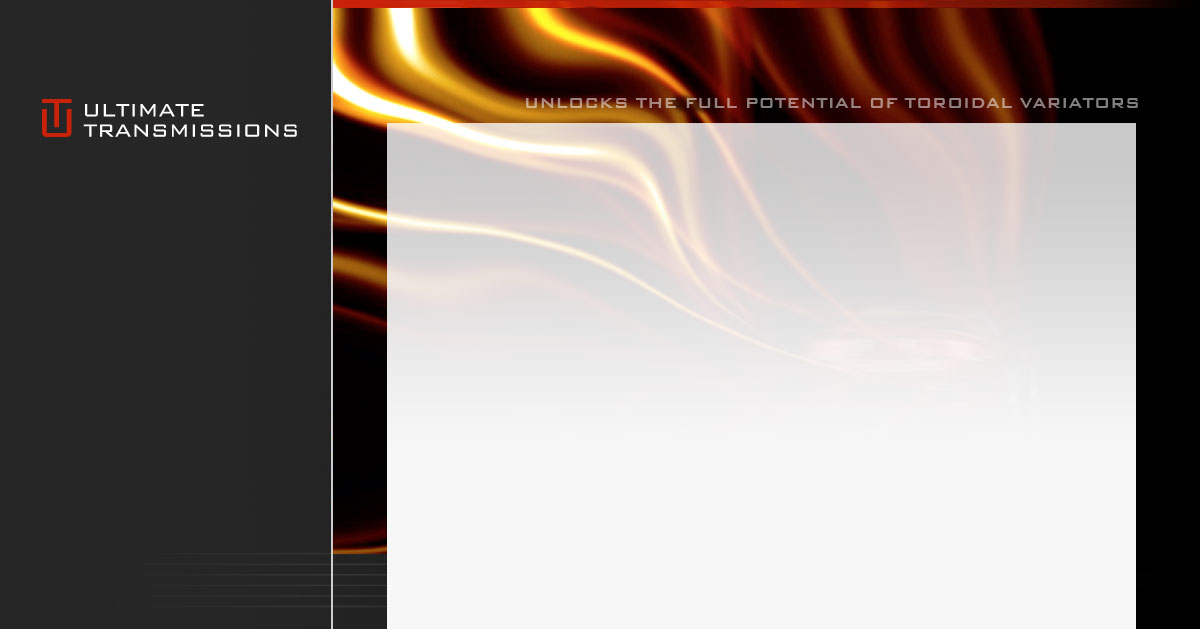CVT Transmission
The Double Roller Concept when combined with the DRS control system, can be applied to any form of transmission including;
- Simple CVT's with a ratio spread up to 5:1,
- CVT's including a secondary gearset to expand the ratio spread to over 7:1
- An IVT arrangement using a secondary planetary set to create reverse gear, geared neutral, and forward gear without any clutch
- A Two Regime IVT arrangement that improves the overall transmission efficiency durability and versatility.
The simple CVT application can compete directly with the belt and chain CVT's promoted by;
Toroidal variators using single rollers, the SFTV and SHTV, promoted by current developers have been unable to do enter the mainstream automotive industry. These variators, when compared to the belt and chain CVT’s have several disadvantages.
- They are heavier and typically larger than the belt and chain CVT's
- They have the wrong proportions tor incorporation in a front wheel drive automobile architecture.
- They have a typically smaller ratio spread than belt type variators
- They are less efficient, particularly the SFTV, than belt or chain CVTs
- They are more expensive than belt or chain CVTs
No other form of CVT has shown any real application to serious mechanical CVT's, because they are even less efficient larger and heavier than toroidal CVT's. this is with the exception of the NuVinci traction Variator which challenges the efficiency and size of a SFTV. The NuVinci CVT has been successfully applied to pushbikes.
> Download PDF Double Roller Full Toroidal Variator - CVT
IVT Transmissions
When a CVT and a secondary planetary gear-set are coupled together it is possible to create a transmission that provides reverse gears, geared neutral, and forward gears without the necessity of a clutch to disengage the wheels from the driving motor.
There are many examples of this type of transmission applied to commercial vehicles and tractors. No successful application has been made in mainstream automotive, although the design has trialed by both Torotrak (Ford Expedition) and NSK (Toyota Lexus).
Use of IVT system with a belt CVT have been proposed in academic papers and Toyota, Jtekt, Jatco and Bosh have lodged patents associated with this application, but no practical trials have been publically undertaken. The instability of the belt controls may be the reason for this. To achieve geared-neutral a very stable control of the variator ratio is required.
The DFTV using DRS controls is capable of producing a Dual range IVT transmission that will be smaller, lighter, more efficient, more durable, more versatile, smaller parts count, and cheaper than other forms of automated transmission, including AMT, DCT, and AT with more than 4 ratios.
The following papers are available for download:
> Design of DFTV based IVT
> The Smallest Automated Transmission
> The Lightest Automated Transmission
> Most Fuel Efficient Automated Transmission
> Most Durable Automated Transmission
> Most Versatile, Smallest Parts Count and Cheapest Automated Transmission
View youtube streams on transmissions
> A very detailed description of a 4 Speed Automatic Transmission
These you tube links describe some applications to CVT type transmissions:
> Audi Pull Chain Wet Clutch
> Push Belt drive CVT - Nissan (in Italian)
> Belt drive (Dodge) CVT explained.
> Open view of push belt CVT
These describe IVT transmissions:
> Hydraulic CVT
> Tractor IVT
> IVT in OPE
> Simplified Torotrak configured as an IVT or split power transmission in a rear wheel drive vehicle, is simplified single stage IVT.
Double Clutch Transmission (DCT):
> Fiat dry clutches
> 7 speed ZF DCT
> Porche 7 speed DCT
> Audi all wheel drive 7 speed DCT
> Automated Manual



